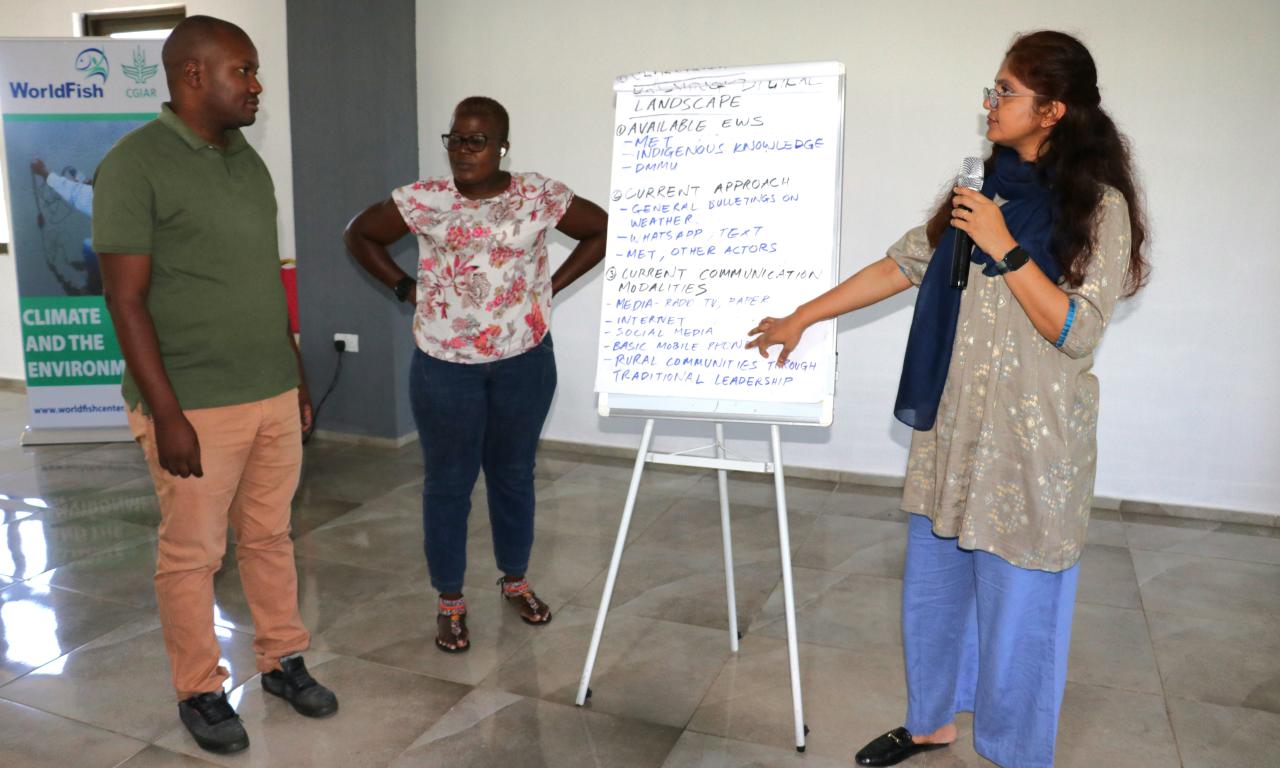
- Digital tools and data-driven insights can empower fisheries and aquaculture stakeholders to make climate-informed decisions and adapt to changing conditions.
- Technology has the power to revolutionize the way we monitor, analyze, and respond to climate-related changes in our fisheries and aquaculture sector.
- The digital Climate Information Services platform aims to address climate variability-induced risks, and thus help in de-risking value chains of Aquatic Food Systems in the Southern African Development Community region.
Digital fisheries information systems are vital in providing climate information services (CIS) to small-scale fishers and aquaculture farmers. They help them to plan and avert possible disaster if received in a timely, accurate, concise and easy-to-understand manner.
Smallholder fishers and farmers in Zambia have been more adversely affected by the effects of climate change when compared to bigger, established commercial farmers. This is because most of them do not have adequate access to timely CIS to enable them to plan. This is exacerbated by the fact that there is currently no tailor-made weather information and services for the Aquatic Food Systems (AFS) sector in the country.
Climate variabilities and extremes have greatly influenced the AFS in the Southern African Development Community (SADC) region. Zambia is no exception. For instance, Zambia's Northern and Luapula provinces have been facing increased rainfall and strong winds while the southern province has increased average temperature and a decline in rainfall. Furthermore, likely, climate change will increasingly lead to temporal variability within the year through more extreme dry and wet periods.
Considering these climate changes, variabilities and extreme induced risks for AFS in Zambia, and the absence of CIS for this economically growing sector, WorldFish in close consultation with the Ministry of Fisheries and Livestock’s Department of Fisheries (DoF) and the Ministry of Green Economy and Environment’s Meteorological and Climate Change Departments, organized a dialogue on digital CIS between 13-14 February 2024 at Tiffanys Canyon in Kafue, Zambia. This event is a part of WorldFish’s support to SADC in executing the “Programme for Improving Fisheries Governance and Blue Economy Trade Corridors in SADC Region” (PROFISHBLUE) funded by the African Development Bank (AfDB).
The dialogue aimed to develop a climate-informed digital decision support system to disseminate advisories for climate risk management. It encompassed different value chain actors among them, Small and Medium Enterprises (SMEs), private sector, NGOs, academicians and the media.
Component lead Dr. Peerzadi Rumana Hossain explained that the dialogue was meant to identify fisheries and aquaculture relevant information to tailor CIS for AFS in Zambia. She further explained that this was instrumental in gaining a better understanding of specific climate challenges that aquatic food producers are facing, and to identify the entry points of CIS support required for associated risk management.
“Building climate resilience and institutional adaptability to shocks is critical to strengthening institutional capacity towards adaptation and mitigation of impacts of climate change and building resilience to other vulnerabilities to the AFS sector in this region,” Rumana stated.
Considering the high priority of the blue economy in the SADC region not only due to the sectoral opportunities in enhancing the economy but also due to the exposure to climate change, the Digital CIS contribution is not limited to addressing economic loss and damage. It also ensures food, nutrition and livelihood security.
In his opening address at the dialogue, Acting Assistant Director – Aquaculture, at the DoF Kalumba Lumbwe emphasized the paramount role of digital climate information and advisory services for fisheries and aquaculture in Zambia.
“Technology has the power to revolutionize the way we monitor, analyze, and respond to climate-related changes in our AFS. Digital tools and data-driven insights can empower our fisheries and aquaculture stakeholders to make informed decisions, adapt to changing conditions, and enhance the resilience of their operations.” Kalumba stated.
Martin Mwale from the DoF emphasized the need for collaboration among line ministries and the need to have focal point persons responsible for transmitting climate change matters to the meteorological department so that fisheries and aquaculture are incorporated in the bulletins presented on national television and radio.
Senior Meteorologist at the Meteorological Department Peggy Thole revealed during the panel discussion that the department does not give any tailor-made weather updates for the aquaculture and fisheries sector. She added that the department is more inclined to other agriculture sectors. So there is immense scope to work on AFS as well.
Identifying Climate Risks and Communicating Climate Information
A smallholder farmer from Luapula province of Zambia Manfred Bwalya explained that the weather information disseminated by the meteorological department needs to be simplified to the level of a farmer so that farmers can understand and act on it appropriately.
Cindy Kunda, a woman fish farmer added that it was also fundamental to ensure that the modes of communicating this climate information is one that smallholder farmers in rural areas can access. She further added that there is a need for service providers to ensure that there is easy access to weather insurance to cushion smallholder fish farmers as well.
The dialogue involved a panel discussion, comprising pre-selected stakeholders and actors and also individual and group exercises.
Two guest presentations were made, providing an overview of the existing digital systems and how aquaculture CIS can be incorporated within the existing digital platforms. One focused on the use of the Intelligent Agricultural System Advisory Tool (iSAT) led by Ram Dhulipa, Senior Scientist at the International Livestock Research Institute (ILRI). The other focused on developing a decision support framework for aquaculture to deliver digital climate information and advisory services. Henk Stander, Chief Technical Officer, Stellenbosch University, led this. It was based on findings and learnings from AICCRA project activities in Zambia, which can further be scaled for PROFISHBLUE in Zambia and Malawi.
Participants identified their climate-risk-sensitive operations for managing the identified risks using the decision framework shared. They presented their own climate adaptive decision-making flowchart with the inclusion of women and youth.
Analysis of the information captured has already started. PROFISHBLUE will build on this momentum to tailor the digital CIS for fisheries and aquaculture to help make climate-informed decisions by managing climate risks in a user-friendly way for AFS.
By de-risking aquatic food systems’ value chains, PROFISHBLUE will enhance opportunities for future climate investment in this sector as well.
